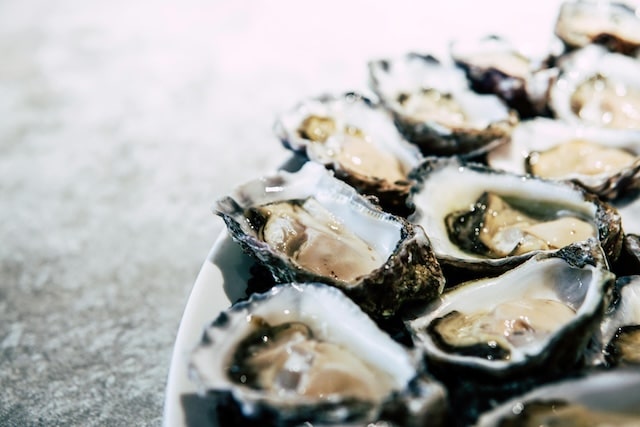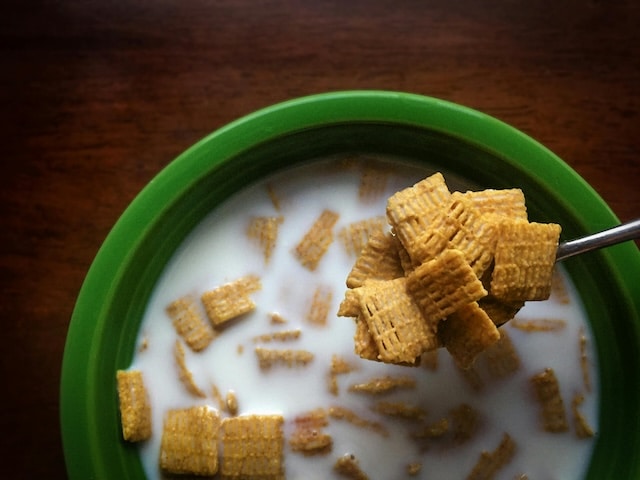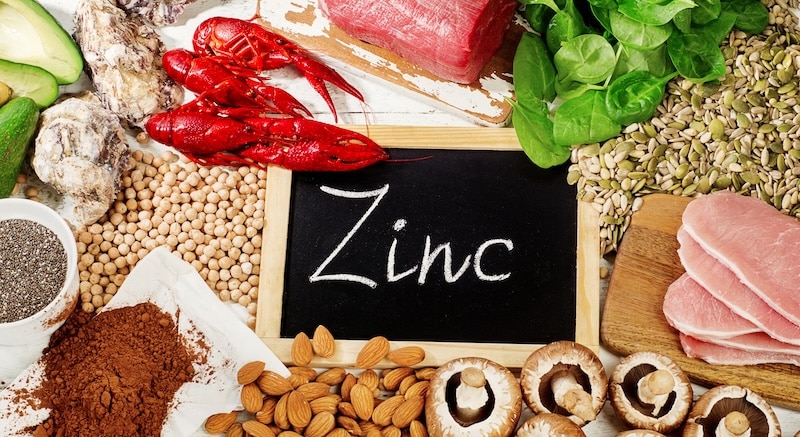Zinc is an essential trace mineral that plays a vital role in many biological processes, including immune function, protein synthesis, and wound healing.
Consuming enough zinc through a well-balanced diet is crucial for maintaining overall health and wellness, and by incorporating both premium and budget-friendly zinc-rich foods, you can ensure your daily needs without compromising quality or cost.
For individuals who struggle to get enough zinc from food, zinc supplements can provide an effective alternative.
Taking zinc before bed may also help support a healthy sleep-wake cycle, as research suggests zinc plays a role in promoting restful sleep and improving sleep quality.
For those looking to enhance both their zinc intake and sleep quality, Rootcha’s Zinc and Magnesium combo offers an excellent solution. This supplement combines two essential minerals that work synergistically to promote restful sleep while supporting overall health.
Last update on 2024-11-15 / This article includes affiliate links/Images via Amazon Product Advertising API. I may earn commissions on purchases made through these links.
How Much Zinc Should You Consume Each Day?

The recommended daily intake of zinc varies by age, sex, and life stage. Here’s a general guideline:
Recommended Daily Intake of Zinc:
- Men (19 years and older): 11 mg per day
- Women (19 years and older): 8 mg per day
- Pregnant women (19 years and older): 11 mg per day
- Lactating women (19 years and older): 12 mg per day
- Children (4-8 years): 5 mg per day
- Children (9-13 years): 8 mg per day
- Teens (14-18 years): 11 mg per day for males, 9 mg per day for females
Upper Tolerable Intake Level (UL) for Zinc:
The upper limit is the maximum amount of zinc you should consume daily without risking adverse health effects. Consuming too much zinc can lead to toxicity, resulting in nausea, headaches, and other issues. The UL for zinc includes both food and supplement sources:
- Adults (19 years and older): 40 mg per day
- Teens (14-18 years): 34 mg per day
- Children (9-13 years): 23 mg per day
- Children (4-8 years): 12 mg per day
It’s essential not to exceed the upper limit unless directed by a healthcare provider, as excessive zinc intake can interfere with the absorption of other important minerals like copper and lead to imbalances in the body.
Top 5 Zinc-Rich Food Sources

Finding foods naturally high in zinc is one of the best ways to support your body’s daily functions. Below are the top five food sources rich in zinc, which can help you meet your daily requirements while providing additional nutritional benefits.
- Oysters
Oysters are not only a luxurious treat but also pack an incredible 32 mg of zinc per 3-ounce serving, equating to 291% of your daily value (DV). Due to their rich zinc content and superior bioavailability, oysters are one of the most effective ways to replenish zinc levels. Although not an everyday option for most, including oysters occasionally can significantly boost your zinc intake and overall nutrition. - Beef (Bottom Sirloin)
Beef contains 3.8 mg of zinc per 3-ounce serving (35% DV), making it a dependable source of highly bioavailable zinc. It is also rich in protein and iron, making it a nutritious and complete food choice. Whether in a stir-fry or roast, incorporating beef into your weekly meals is an excellent way to ensure you’re getting enough zinc. - Crab (Blue Crab)
Blue crab provides 3.2 mg of zinc per 3-ounce serving (29% DV), offering a nutrient-rich seafood option that can enhance your diet. Crab is also rich in omega-3 fatty acids, which contribute to heart health and cognitive function. For seafood lovers, blue crab is an easy and delicious way to meet zinc needs while enjoying its multiple health benefits. - Fortified Breakfast Cereals (Cheerios)
Fortified cereals can contain significant amounts of zinc. For example, Cheerios offer a whopping 13.4 mg of zinc per serving, covering over 100% of your daily needs in one bowl. Many cereals are fortified with essential nutrients like zinc, making them an easy, affordable, and convenient way to improve your nutritional intake. However, opting for low-sugar cereals is crucial to avoid excessive sugar consumption and keep your diet balanced. - Pumpkin Seeds
A 1-ounce serving of roasted pumpkin seeds contains 2.2 mg of zinc (20% DV), making them a versatile and nutritious addition to any diet. Pumpkin seeds are also packed with fiber, healthy fats, and magnesium, contributing to overall wellness. Sprinkle them on salads or snack on them throughout the day to enhance your zinc intake without much effort.
5 Best Budget-Friendly Zinc Sources

Zinc is readily available in many budget-friendly food sources that can be easily integrated into everyday meals. These options allow you to maintain optimal health without overspending, making it simple to balance both cost and nutrition.
- Fortified Breakfast Cereals (Cheerios)
Cheerios, with 13.4 mg of zinc per serving, offer an extremely affordable and efficient way to meet your daily zinc needs. Fortified cereals are designed to provide essential nutrients in a budget-friendly package, making them a staple for many households. Just be sure to choose low-sugar options to keep your breakfast nutritious and in line with a balanced diet. - Eggs
One large egg contains 0.6 mg of zinc (5% DV), offering an inexpensive and widely available source of this essential mineral. In addition to zinc, eggs are a great source of protein, vitamins, and healthy fats, making them a nutritional powerhouse. Including eggs in your meals several times a week is an easy, cost-effective way to enhance your overall nutrient intake. - Peanuts (Dry Roasted)
A 1-ounce serving of dry-roasted peanuts provides 0.8 mg of zinc (7% DV), making them an affordable snack that also delivers protein and healthy fats. Peanuts are easy to store and can be used in a variety of meals or eaten on their own as a satisfying snack. Their affordability and versatility make peanuts a great option for boosting zinc intake on a budget. - Whole Wheat Bread
One slice of whole wheat bread contains 0.6 mg of zinc (5% DV), offering a simple and cost-effective way to include more zinc in your diet. Whole grains, like those in whole wheat bread, provide additional benefits such as fiber, which supports digestion and heart health. Incorporating whole wheat bread into your meals can help you reach your zinc goals without much extra effort. - Canned Kidney Beans
Canned kidney beans contain 0.6 mg of zinc per half-cup serving (5% DV) and are an inexpensive, nutritious pantry staple. Beans are not only rich in zinc but also provide fiber and protein, making them a great plant-based option for overall health. Adding canned beans to soups, stews, or salads can help you meet your daily zinc needs while keeping grocery costs low.
Zinc-Rich Drinks
Drinks are generally not a significant source of zinc, but some beverages can still contribute modestly to your daily intake. Here are a few drinks that contain zinc:
- Fortified Plant-Based Milk (Soy, Almond, Oat)
Many plant-based milk alternatives are fortified with zinc and other essential nutrients. Depending on the brand, they can offer around 1-3 mg of zinc per serving, making them a good option for individuals seeking to boost their intake through beverages. - Fortified Cow’s Milk
Cow’s milk, especially when fortified, can provide approximately 1 mg of zinc per cup. It also offers other essential nutrients like calcium and vitamin D, contributing to a balanced diet. - Protein Shakes or Smoothies
Some protein powders, especially those containing whey or casein, may include added zinc or naturally provide it from the ingredients used. These can contribute up to 1-5 mg of zinc per serving, depending on the product. - Cocoa or Hot Chocolate (Made with Fortified Milk)
Cocoa powder itself contains trace amounts of zinc, and when prepared with fortified cow’s milk or plant-based milk, it can contribute a small but useful zinc boost to your diet. - Fortified Meal Replacement Shakes (e.g., OWYN, Ensure, Boost)
Many meal replacement drinks are fortified with zinc to ensure they provide a balanced nutrient profile. These drinks can offer 3-7 mg of zinc per serving, depending on the brand and formulation.
While these drinks provide some zinc, food sources remain the most reliable way to meet your daily needs. If you’re looking for additional ways to boost zinc intake, pairing these drinks with zinc-rich foods or supplements can be an effective approach.
Can Everyone Get Enough Zinc From Food?
Although most people can get enough zinc from a healthy diet, some people may struggle.
For individuals who struggle to meet their daily zinc needs through food alone, supplements can play a crucial role in maintaining optimal zinc levels.
Certain populations are at higher risk of zinc deficiency, and supplementation may be particularly beneficial for them. These groups include:
At-Risk Populations for Zinc Deficiency:
- Vegetarians and Vegans
Plant-based diets often contain phytates, compounds found in grains and legumes that inhibit zinc absorption. Since meat and seafood are rich in bioavailable zinc, vegetarians and vegans may have a harder time getting enough zinc from their diet alone. - Pregnant and Lactating Women
During pregnancy and lactation, the body’s zinc requirements increase to support fetal development and milk production. Women in these life stages may benefit from zinc supplements to ensure adequate intake. - People with Gastrointestinal Disorders
Conditions such as Crohn’s disease, ulcerative colitis, and celiac disease can impair zinc absorption, increasing the risk of deficiency. Additionally, individuals who have undergone bariatric surgery may also experience reduced zinc absorption and require supplements. - Elderly Individuals
Older adults often consume less zinc due to decreased appetite, lower food intake, and potential challenges with nutrient absorption. Zinc supplements can help prevent deficiency and its associated effects, such as weakened immune function. - People with Chronic Alcohol Use
Chronic alcohol consumption can decrease zinc absorption and increase zinc loss through urine. Individuals in this group may need supplements to maintain adequate zinc levels.
Zinc and Magnesium for Sleep: Rootcha’s Zinc and Magnesium Combo
For people looking to support their zinc intake and enhance sleep quality, Rootcha’s Zinc and Magnesium supplement provides a highly effective combination.
Zinc is involved in numerous metabolic processes, including those that regulate the nervous system, while magnesium plays a key role in muscle relaxation and promoting a calm state. Together, these minerals work synergistically to support a healthy sleep-wake cycle, helping you fall asleep more easily and enjoy deeper rest.
Taking this zinc-magnesium combination before bed may also help reduce sleep disturbances, making it an excellent choice for individuals looking to improve their sleep hygiene while ensuring sufficient zinc intake.
Supplements like Rootcha’s blend can be particularly beneficial for those who find it challenging to meet their daily zinc needs through diet alone or for anyone seeking an extra boost for restorative sleep.



Leave a Reply